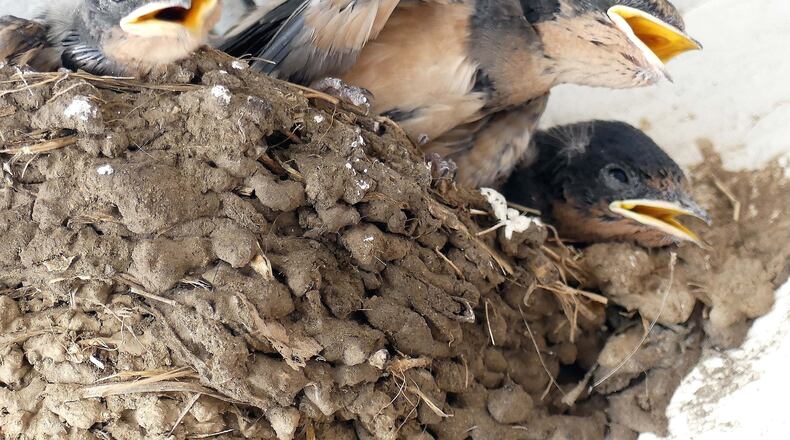It’s a common scene in June — super busy songbird parents grasping insects or other morsels in their beaks, heading back to nests to deliver the food to hungry nestlings.
At the nests, the loudly cheeping babies, with mouths wide open and necks stretching to the limit, beg for the goodies from their parents. The youngsters must be fed several times an hour to meet high energy demands for their rapid growth.
Last weekend, we were able to observe close-up a pair of barn swallows feeding their four babies in a nest of dried mud and straw, attached to a porch ceiling at the visitors center at the Hardman Farm State Historic Site in White County
When a parent flew in with an insect or other tidbit, it was dropped into a nestling’s gaping mouth. Then, a second later, the parent was off again to snatch another morsel to feed another baby.
Watching this, I pondered some questions. How does a songbird parent decide which nestling gets the food? Does each baby get an equal amount? How does a parent know which one has been fed?
Such questions intrigue bird researchers as well, judging from the number of scientific studies and other material on the subject. Even so, there is still debate over how songbird parents allocate food to offspring.
In general, songbird nestlings’ solicitations for food from parents is simply called “begging.” Several studies suggest that the nestling that starts to beg first, stretches it neck the highest and holds its beak closest to the parent is the one that gets the food. Perhaps nestlings that were just fed don’t beg as vigorously. However, songbird parents don’t seem to keep track of which babies have been fed.
Studies of several songbird species also indicate that all nestlings receive similar amounts of food from parents.
IN THE SKY: From David Dundee, Tellus Science Museum astronomer: Summer officially starts at 6:07 a.m. on Thursday — the summer solstice. It is also the longest day of the year. The moon will be first quarter on Wednesday. Venus is in the west just after dark and sets about two hours later; it will appear near the moon tonight. Mars rises out of the east just before midnight. Jupiter is high in the east at dusk. Saturn rises out of the east just before dark.
About the Author
Keep Reading
The Latest
Featured


